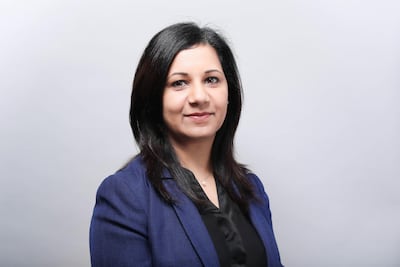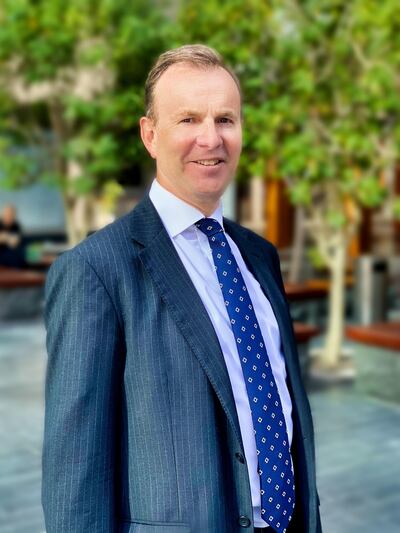Three quarters of companies in the UAE do not set aside specific assets for end-of-service benefits, according to a new survey from Swiss insurer Zurich.
The study follows up on a similar report in 2016, which found 83 per cent cover their end-of-service liabilities from their operating cash flow.
“It still indicates that there is a dearth of setting funding aside for end-of-service benefits,” says Reena Vivek, senior executive officer at Zurich Workplace Solutions, a new entity in the process of being incorporated in the Dubai International Financial Centre.
“There is still a gap in the market from companies to make sure they are taking care of these liabilities in a robust manner. There is a gap in transparency to employees as to how these funds are provisioned for, if they are at all,” she adds.
Zurich supplies employer-sponsored workplace savings schemes to about 70 companies across the GCC, with $1 billion (Dh3.67bn) in assets under management. It will also be the administrator for the DIFC’s Employee Savings plan (Dews) to replace the gratuity, scheduled to start on January 1.
The 2019 poll, conducted by Insight Discovery, surveyed finance executives from 161 companies, employing a total of 75,000 people. About a third of the companies surveyed employ between 50 and 150 people. Close to 60 per cent are part of a larger global business.
About 80 per cent of those polled, which included chief financial officers and finance managers, said a mandatory funding requirement would be a good decision.
“It’s clear that people recognise the need. It’s also clear that employers haven’t done much in this space,” Ms Vivek says.

The title of Zurich's report, The new dawn in employment benefits for the GCC, suggests the current system is ripe for change, led by government intervention and developments in the Emirates.
UAE employees are entitled to an end-of-service gratuity after completing one year of employment, with those that have worked between one and five years paid 21 days of basic pay. After five years, they are entitled to 30 days of basic pay for each year thereafter.
However, the gratuity system seems to be in line for an overhaul to accommodate longer average employment tenures and more closely align with global retirement savings standards.
The Federal Authority for Government Human Resources (FAHR) completed a study earlier this year to enhance and improve benefits. The study proposed a new savings fund that would collect end-of-service contributions from employers to be invested and generate financial returns. In May, FAHR said the final plan would be submitted to decision makers at a later date.
Meanwhile, the DIFC will be the first major body in the UAE to overhaul the gratuity system if it goes ahead with its Dews plan as scheduled. Zurich, as the administrator, and Equiom, as the master trustee, are in the process of applying for new category licenses. Mercer will be the investment adviser.
“Zurich International Life’s second report on end-of-service benefits comes at an opportune time, as it draws attention to the evolving landscape of employment benefits in the region,” said Arif Amiri, chief executive of the DIFC Authority, in the report.
The study draws attention to some of the criticisms around gratuity, including companies not measuring their end-of-service liabilities often enough and employees not being protected if a company liquidates.
About half of companies attempt to measure their benefit liabilities on a monthly basis, the poll found, while about 15 per cent measure it on a quarterly basis and about a quarter measure it annually.
Although the percentage of companies that set aside assets to cover end-of-service benefits has risen from 16 per cent to 25 per cent over the last three years, those who do set assets aside do not have enough to fully cover the amount. Only 32 per cent of companies had assets that would cover at least three quarters of the liabilities.
“There is a clear mismatch with the liability on the balance sheet side and the fact that it’s invested in short term assets,” Ms Vivek says.
About half of the assets set aside is held in cash, as was the case in 2016, the study found. Another 17 per cent is held in fixed income securities, while the remainder is held in a variety of assets, including property, life insurance products and equities. Only about 30 per cent of the companies surveyed separate these assets from those of the company by establishing a trust.
From an employee’s perspective, this liability-assets mismatch and lack of transparency can become a problem “in the event of a company not performing or going into liquidation,” says Ms Vivek.
Perhaps the most high-profile case in the Emirates is the 2018 collapse of private equity firm Abraaj. This summer the Dubai Financial Service Authority fined the company a record $315 million for misleading investors and misappropriating funds.
In June, Sheikh Mohammed bin Rashid, Vice President of the UAE and Ruler of Dubai, enacted a new insolvency law for companies operating in the DIFC. Employees also have some protection through the courts system, but it can be a long and costly process.
“Employees can take action against the company, but the challenge you have in a market like the UAE is a lot of the employees are expats and when you lose your job, your visa gets cancelled and you have to leave the country,” Ms Vivek says. “So the ability to stay in the country and fight those battles with the courts remains limited.”
Another challenge from an employee's point of view is the existing gratuity system does not allow for long-term savings. In a March Zurich-YouGov poll of about 750 UAE residents, 47 per cent of respondents said they do not plan to direct their end-of-service benefit towards retirement savings. Instead, they said they would use it to clear outstanding debt, pay a bill or buy a luxury item.
“Typically people’s attitude towards savings is spend first and save the rest, which is probably not the most robust way to make long-term savings in a systematic, disciplined manner,” Ms Vivek says.
The DIFC’s Dews scheme seeks to address this by moving from the current “defined benefit” entitlement to a “defined contribution” plan. Employers will be required to contribute to the fund on a monthly basis and employees can choose from five investment risk profiles. Employees also have the option to make additional contributions.
The default low/moderate risk fund would try to match what an employee would earn if they maintained themselves in the current end-of-service benefits scheme and targeting salary inflation over the years.
“The investment risk does shift to the employee in this case, but the employee does get the benefit of transparency and being able to manage investments as appropriate to their risk appetite,” says Ms Vivek.

Details of the plan have been emerging recently in DIFC town hall meetings ahead of the January roll-out. The targeted returns range from 2.5 per cent and 6.8 per cent, while the fees are between 1.26 and 1.33 per cent, investment adviser Mercer told The National.
The low risk fund, aimed at capital preservation, is targeting returns of 2.5 and 3 per cent and has the lowest fee of 1.26 per cent. The default low/moderate risk fund targets growth of 5.5 per cent with a fee of 1.33 per cent. The moderate risk fund returns are expected at 6.3 per cent and moderate/high at 6.5 per cent, both with a fee of 1.32 per cent. Finally, the high risk fund targets returns of 6.8 per cent with a 1.31 per cent fee.
“There is no guarantee the minimum will be the same as the end-of-service, but at the same time you may well get far more than the end-of-service, so there is upside, as well as downside,” says John Benfield, Mercer partner and market wealth business leader for the Middle East, Africa, India and Turkey.
Outside the DIFC, Mercer and Zurich are both involved in discussions with government officials to discuss the best way forward in reforming end-of-service gratuity on a wider scale.
“This does require government intervention,” says Ms Vivek. “Without the right legislative framework, we wouldn’t get the comprehensiveness we would need to deliver something like this to all employees within the market and deliver the right kind of protection across the board.”


